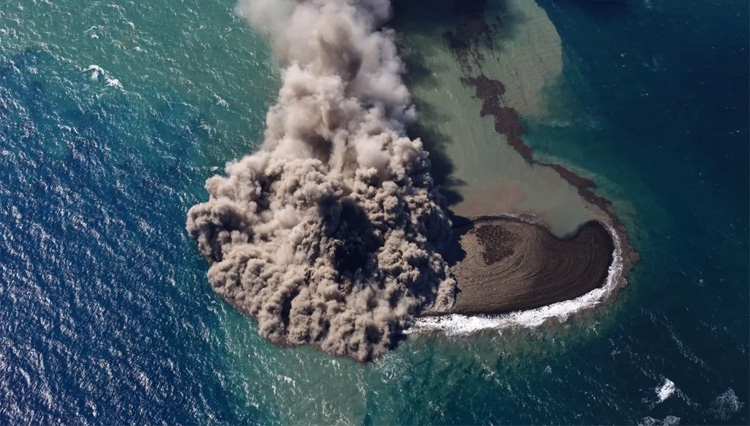Japan gets a brand new island after underwater volcano eruption
Japan, famed for its numerous islands, including those that have been created through volcanic processes, has once again witnessed something remarkable.
If reports are to go by, a new island has now emerged within the vicinity of Japan’s Ogasawara island chain, after the eruption of an underwater volcano in late October 2023.
This remarkable event offers an intriguing insight into the Earth’s dynamic and ever-changing geological processes.
The newly created island has not been named yet. However, as far as its measurement goes, it is approximately around 100 m in diameter, and took shape through phreatomagmatic eruptions. These eruptions are actually triggered when magma reacts with seawater, thereby resulting in explosive releases of ash and steam.
Reportedly, the eruption started on October 21, 2023, around 1 km off the coastline of Iwoto Island, which was formerly known as Iwo Jima. It’s a site with a significant historical significance as it witnessed World War II’s most intense battles. Reports add that these eruptions continued for around 10 days, which further led to the accumulation of volcanic material on the shallow seabed, ultimately reaching above the sea’s surface.
This latest island is not the first instance of volcanic activity giving birth to a new island in the vicinity. The Ogasawara island chain, also known as the Bonin Islands, constitutes a volcanic arc comprising over 30 islands and islets, some of which remain volcanically active. The most recent island formation event within this region transpired in 2013, stemming from the eruption of another underwater volcano.
Elaborating more on this, Associate Professor Fukashi Maeno, affiliated with Tokyo University’s earthquake research institute, has officially verified the presence of phreatomagmatic eruptions near Iwoto. Following a site examination in late October, Maeno conveyed that during the eruptions, smoke and ash reached heights exceeding 50 m, which were observed every few minutes during the eruptions.
According to him, the recent formation of the new island serves as an indication of renewed magmatic activity in the area. It’s likely that the island’s dimensions and configuration might undergo further alterations if the eruptions continue, but there is also the likelihood of it submerging beneath the sea’s surface.
Reports add that the newly formed island may not have an enduring existence, given its composition of delicate volcanic rocks that are susceptible to erosion by oceanic waves and currents. Experts propose that its longevity could be extended if it gets covered by more durable substances such as lava, although this relies on the potential resumption of volcanic activity.

